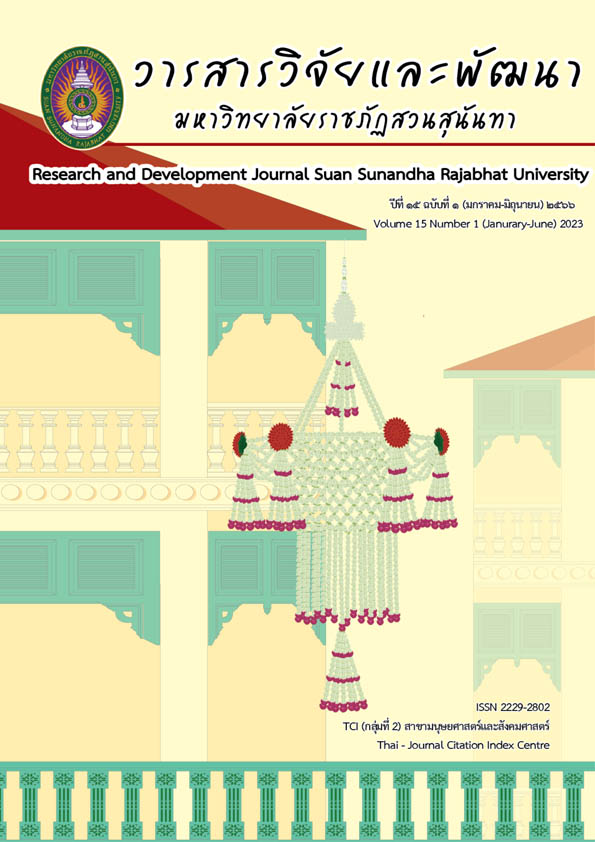การจัดประสบการณ์การเรียนรู้ด้วยเกมเป็นฐานเพื่อพัฒนาทักษะพื้นฐานทางคณิตศาสตร์ของเด็กนักเรียนอนุบาลชั้นปีที่ 2 ในยุคชีวิตปกติวิถีใหม่
คำสำคัญ:
การเรียนรู้ด้วยเกมเป็นฐาน, ทักษะพื้นฐานทางคณิตศาสตร์, ยุคชีวิตปกติวิถีใหม่บทคัดย่อ
การวิจัยเรื่องนี้มีวัตถุประสงค์เพื่อ 1) หาประสิทธิภาพการจัดประสบการณ์การเรียนรู้ด้วยเกมเป็นฐาน (Game Based Learning: GBL) 2) เปรียบเทียบทักษะพื้นฐานทางคณิตศาสตร์ก่อนและหลังการจัดประสบการณ์ GBL และ 3) ศึกษาความพึงพอใจที่มีต่อการจัดประสบการณ์ GBL กลุ่มตัวอย่างที่ใช้วิจัยเป็นเด็กนักเรียนชั้นอนุบาล ปีที่ 2.4 โรงเรียนพิณพลราษฎร์ ตั้งตรงจิตร 12 สังกัดสำนักงานเขตพื้นที่การศึกษาประถมศึกษาพิษณุโลก เขต 2 ในภาคเรียนที่ 1 ปีการศึกษา 2565 จำนวน 13 คน ด้วยวิธีการเลือกแบบเจาะจง เครื่องมือที่ใช้ในการวิจัย ได้แก่ สื่อเกมสำหรับจัดประสบการณ์ GBL แผนการจัดประสบการณ์ GBL แบบประเมินเชิงปฏิบัติการทักษะพื้นฐานทางคณิตศาสตร์ชนิดเลือกตอบ ที่มีค่าความเชื่อมั่น 0.87 และค่าอำนาจจำแนก 0.27 ถึง 0.55 และแบบสอบถามความพึงพอใจที่มีต่อการจัดประสบการณ์ GBL ตามวิธีการของออสกูด โดยมีค่าความเชื่อมั่น 0.77 สถิติที่ใช้ในการวิจัย ได้แก่ ค่าประสิทธิภาพการจัดประสบการณ์ GBL ค่าเฉลี่ย และการทดสอบความแตกต่างระหว่างค่าเฉลี่ย 2 กลุ่มที่มีความสัมพันธ์กัน ผลการวิจัยพบว่า การจัดประสบการณ์ GBL มีประสิทธิภาพ 96.19/97.14 ทั้งนี้ก่อนการจัดประสบการณ์ GBL กลุ่มตัวอย่างมีทักษะพื้นฐานทางคณิตศาสตร์เฉลี่ยอยู่ที่ 1.56 แต่หลังการจัดประสบการณ์ GBL กลุ่มตัวอย่างมีทักษะพื้นฐานทางคณิตศาสตร์เฉลี่ยอยู่ที่ 4.65 ซึ่งสูงกว่าก่อนการจัดประสบการณ์ GBL อย่างมีนัยสำคัญทางสถิติที่ระดับ 0.05 นอกจากนี้กลุ่มตัวอย่างมีค่าความพึงพอใจเฉลี่ยอยู่ที่ 1.93 ซึ่งเป็นความพึงพอใจที่มีต่อการจัดประสบการณ์ GBL ในเชิงบวก
เอกสารอ้างอิง
Bangkokbiznews. (2020, November 18). What is New Normal? When Covid-19 Pushing Us to The New Normal. Retrieved 2021, from https://www.bangkokbiznews.com/lifestyle/882508 (In Thai)
Brahmawong, C. (2013). Testing The Media Performance or Teaching Series. Silpakorn Educational Research Journal, 5(1), 7-20. (In Thai).
Chuayprakong, C., Ragkhanto, S., & Srinok, S. (2022). The Development Problem Solving by Using the Game Based Learning (GBL) on Money Policy and Fiscal Policy for High School 6 Students at Dongtanwittaya School. Journal of Management and Local Innovation, 4(6), 155-167 (In Thai).
Dale, E. (1969). Audio Visual Method in Teaching (4th ed.). New York: Holt Rinehart and Winston Inc.
Dechakup, Y. (1999). Management of Education for Early Childhood Children. Bangkok: Max (In Thai).
Eltahir, M., Alsalhi, N., Al-Qatawneh, S., AlQudah, H., & Jaradat, M. (2021). The Impact of Game-Based Learning (GBL) on Students’ Motivation, Engagement and Academic Performance on An Arabic Language Grammar Course in Higher Education. Education and Information Technologies, 26, 3251–3278. doi:10.1007/s10639-020-10396
Funchien, N. (2020). What is Games Based Learning or GBL? Retrieved November 18, 2021, from https://www.trueplookpanya.com/ blog/content/84436/-blog-teamet
Jitdon, B. (1989). Organizing Experiences to Create Mathematical Concepts. Teaching Material: Promoting Life Experiences in Early Childhood Education. Nonthaburi: Sukhothai Thammathirat Open University (In Thai).
Kamdar, J. (2022, October 16). Club president Maledphanbanturg.
McClelland, D. C. (1965). Toward a theory of motive acquisition. American Psychologist, 20(5), 321–333.
Mei, S., Ju, S., & Adam, Z. (2018). Implementing Quizizz as Game Based Learning in The Arabic Classroom. European Journal of Social Science Education and Research, 5(1), 194-198. doi:10.2478/ejser-2018-0022
Methaneethorn, J., Sudchada, P., & Insuk, S. (2021). Game-Based Learning for Teaching English to Thai Pharmacy Students. Kasetsart Journal of Social Sciences, 42, 617–622 (In Thai). doi:10.34044/j.kjss.2021.42.3.24
Ministry of Education. (2017). Early Childhood Education Curriculum B.E. 2560. Bangkok: Bureau of Academic Affairs and Educational Standards, Office of the Basic Education Commission, Ministry of Education (In Thai).
Ministry of Education. (2021, 11 18). Measures to Prevent and Control The Epidemic Situation of The Coronavirus Disease 2019 of The Ministry of Education (1st Additional). Retrieved from https://ops.moe.go.th (In Thai)
Muenchang, S., Sirisawat, C., & Chauvatcharin, N. (2020). The Effect of Using Game –based Learning on Scientific Understandingon Genetic Inheritance for Grade 10Students. CMU Journal of Education, 3(3), 1-13 (In Thai).
Phutoson, P., Mektrirat, W., & Insombat, B. (2018). The Effect of Educational Game Activities to Enhance Mathematical Skills of Early Childhood Children. Social Sciences Research and Academic Journal, 13(39), 127- 140 (In Thai).
Saengthong, P., Palinton, N., Chaiyakan, A., Boodsabong, C., & Soha, J. (2021). Effect of Educational Game Actives for Enhancing Mathematical Skill of Early Childhood. Journal of MCU Ubon Review, 6(2), 77-88 (In Thai).
Silpcharu, T. (2010). Research and Statistical Analysis with SPSS (11th ed.). Bangkok: Business R&D (In Thai).
Suwannakeeree, W., Jullmusi, O., & Tangkawanich, T. (2016). Simulation-Based Learning Management for Nursing Students. Journal of Nursing Science Chulalongkorn University, 28(2), 1-14 (In Thai).
Tantiphalachewa, K. (2008). Early Childhood Education Instructional Model. Bangkok: Brain-Base Book (In Thai).
Tayraukham, S. (2004). Documents for Teaching Introductory Research Studies. Maha Sarakham: Faculty of Education, Mahasarakham University (In Thai).
UKEssays. (2018). Analysis Edward Lee Thorndike's Behaviour Experiments. Retrieved November 18, 2021, from https://www.ukessays.com/essays/philosophy/edward-lee-thorndike-and-his-behaviour-experiments-philosophy-essay.php?vref=1
Vu, P., & Feinstein, S. (2017). An Exploratory Multiple Case Study About Using Game-Based Learning in STEM Classrooms. International Journal of Research in Education and Science, 3(2), 582-588. doi:10.21890/ijres.328087
Watawatana, R., & Patanasorn, C. (2022). The Effect of Task Repetition on The Development of Pragmatic Competence of Thai EFL University Students. Udon Thani Rajabhat University Journal of Humanities and Social Science, 11(1), 191-208 (In Thai).
ดาวน์โหลด
เผยแพร่แล้ว
รูปแบบการอ้างอิง
ฉบับ
ประเภทบทความ
สัญญาอนุญาต
ลิขสิทธิ์ (c) 2023 มหาวิทยาลัยราชภัฏสวนสุนันทา

อนุญาตภายใต้เงื่อนไข Creative Commons Attribution-NonCommercial-NoDerivatives 4.0 International License.
บทความที่ได้รับการตีพิมพ์เป็นลิขสิทธิ์ของ สถาบันวิจัยและพัฒนา มหาวิทยาลัยราชภัฎสวนสุนันทา
ข้อความที่ปรากฏในบทความแต่ละเรื่องในวารสารวิชาการเล่มนี้เป็นความคิดเห็นส่วนตัวของผู้เขียนแต่ละท่านไม่เกี่ยวข้องกับมหาวิทยาลัยราชภัฎสวนสุนันทา และคณาจารย์ท่านอื่นๆในมหาวิทยาลัยฯ แต่อย่างใด ความรับผิดชอบองค์ประกอบทั้งหมดของบทความแต่ละเรื่องเป็นของผู้เขียนแต่ละท่าน หากมีความผิดพลาดใดๆ ผู้เขียนแต่ละท่านจะรับผิดชอบบทความของตนเองแต่ผู้เดียว





